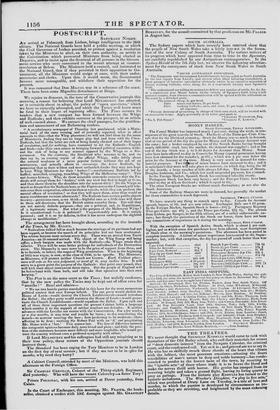We rejoice to discover, in the tone of the Conservative
journals this morning, a reason for believing that Lord MELBOURNE has adopted, or is certainly about to adopt, the policy of "open questions," which we have so earnestly advocated, and which the Tories well know must be fatal to their hopes of regaining office. The Times assures its readers that a new compact has been formed between the Whigs and Radicals ; and then exhibits soreness at the prospect, in an article of well-conned abuse. We extract the chief passages, for the gratifica- tion and amusement of our Reforming readers.
g' A revolutionary newspaper of Thursday last proclaimed, while a Minis- terial hack of the same evening and of yesterday repeated, what in effect amounts to this—that the Whig placemen (we will not libel them by the name of Ministers), finding they can no longer play fast and loose with the Ultra- Radicals, but that the latter are sick of being hourly cheated out of their hopes of revolution, anti fur nothing, have consented to let the Radicals—English and Irish—take their own course in bringing forward political measures, with- out the risk of being in any manner opposed by the Whigs as a Go- vernment. On the contrary, the blockhead who assumes to be, and we dare say is, an evening organ of the official Whigs, talks loftily about the natural weakness of a mere popular faction without the aid of an aristocracy, and actually affects to encourage the fierce Radicals, by promising that in their wildest and most outlandish freaks they may now hope to have Whig Ministers for their ' leaders !'—revolutionary Radicals led by baffled, mortified, cringing, trembling Whigs of the Melbourne rump !! This out-hoaxes history. Why, do those miserable coxcombs conceive that the Ra- dicals will accept them for ' leaders,' with any view but first to laugh at am], and then shove them by the shoulders into the nearest ditch? Do the Whigs so much as dream that the Radicals here, or the Papists across the Channel,will tole- rate even their cooperation, otherwise than as vassals, while they can per form the menial offices of revolution? or that they will spare them, more than would so many troublesome vermine afterwards? The Radicals have certain public objects to carry—pernicious ones, as we think—frightful ones as a little time will show to these self-deceivers, that the British nation consider them. But still they are not merely definite purposes—they are a political, and, to Republicans, of a legitimate nature. But what is the purpose of the Melbourne Whigs? Is it constitutional ?—is it political? Unquestionably not. It is simply personal ; and it is so far definite, in that it has never undergone the slightest change or modification."
The arrangement has been brought about, according to the inuendo of the Times, by Mr. Ewer. 4' Radicalism sulked full as much because the cravings of its partisans had not been sopped, as because the march of its principles had not been accelerated. The schism became more serious every day. There was an arrival from Not th America—an ill-omened arrival. The object of the Whig Rump still being office, a fresh bargain was made with the Radicals—the Whigs retain their salaries. There will be some better pickings for individuals of the Destructive crew. The Monarchy is once more to be the price of support from them, and is to furnish, as before, the wages of Whig prostitution. What in the beginning of 1835 was vague, is now, at the close of 1636, to be specific. The Ministers, as Ministers, will protect neither Church nor Crown. Each Cabinet place- man will vote as his own judgment, or want of it, may incline him. It will serve to a given point the purpose of the Radicals : that point once passed, they will kick their abject instrument down stairs. But the people of England will be beforehand with them both, and will take that operation into their own keeping."
The Post is on the same scent as the Times ; but wofully confesses, that by the new policy the Tories may be kept out of office even for "months ! " Read and admire- " We see two hostile parties marshalled in this hour for the most momentous political contest that ever Europe beheld. The one parry would abolish the House of Lords—would destroy the Church Establishment—would introduce the Ballot : the other party would maintain the House of Lords—would perpe- tuate the Church Establishment—would repudiate the Ballot. Upon each and all of these three important questions the present Cabinet holds a language which entitles it to the support of neither assailant nor defender. It neither advances with the Leveller nor resists with the Conservative. For a few weeks, or a few months, it may trim and truckle by turns ; to-day conciliating the honest—to. morrow courting the base ; here professing to be moderate—there affecting to be firm ; soothing Sir Robert Peel with an if,' and propitiating l'slr. Hume with a ' but.' This cannot last. The line of difference between the antagonist opinions becomes daily more broad and plain ; and daily the posi- tion of the statesmen becomes more difficult and more laughable, who would go- vern the country without even a professed sympathy with either."
If Lord MELBOURNE and his colleagues had still any misgiving as to their true policy, these terrors of the Opposition journals should instruct them.
The Standard has been urging the Tory Members to be in London on the first day of next session ; but if they are not to be in office for months, why need they hurry?


























 Previous page
Previous page